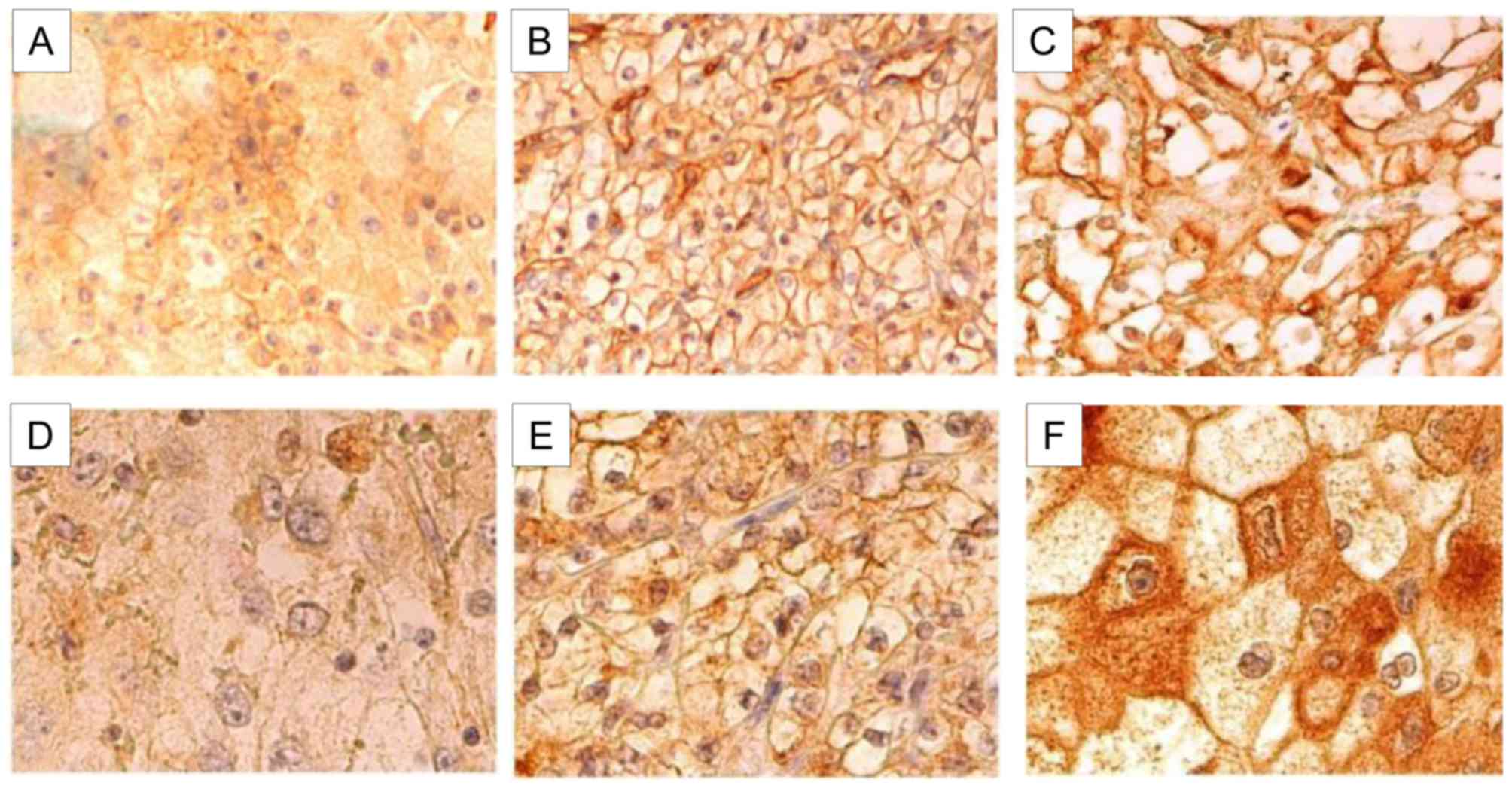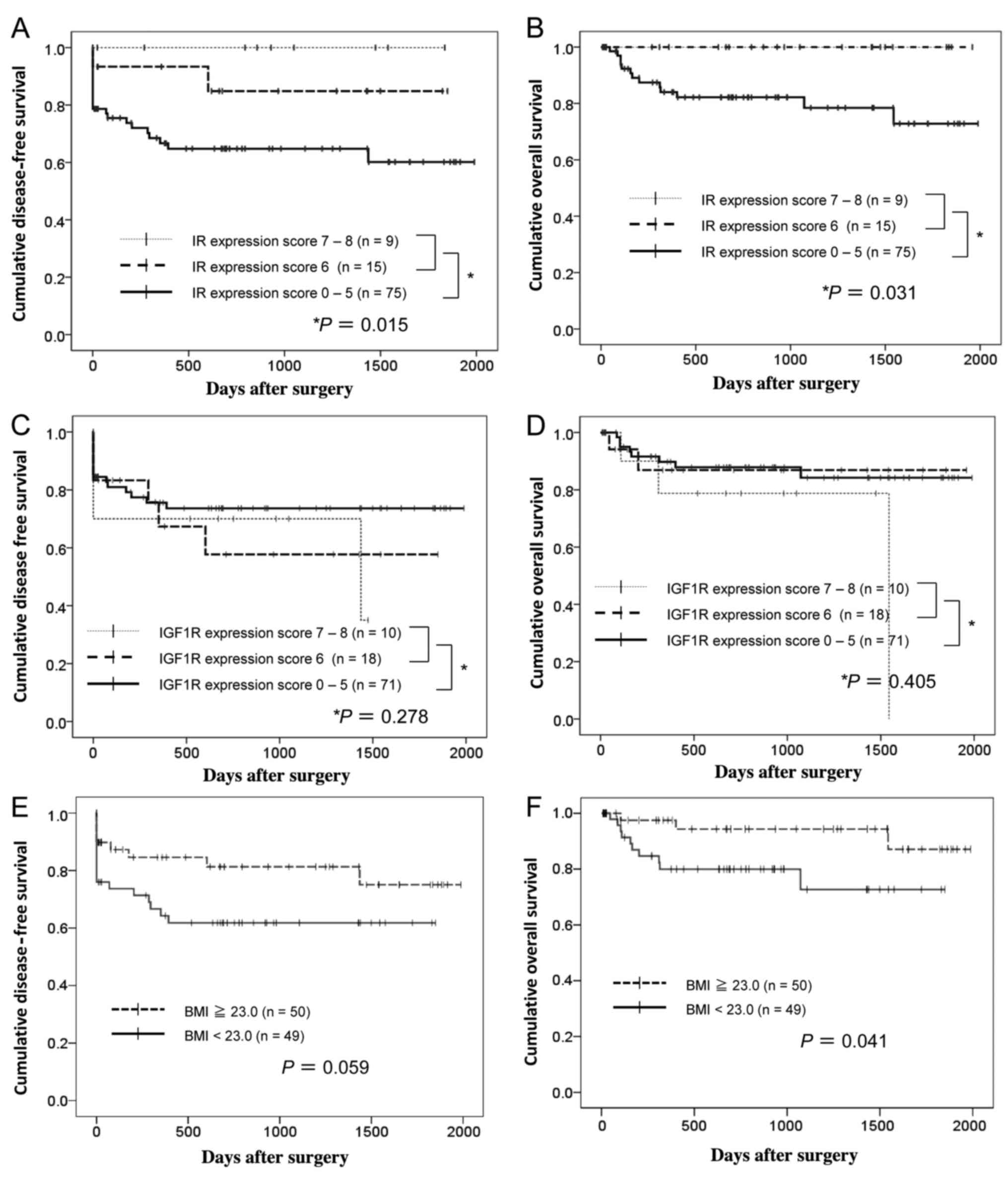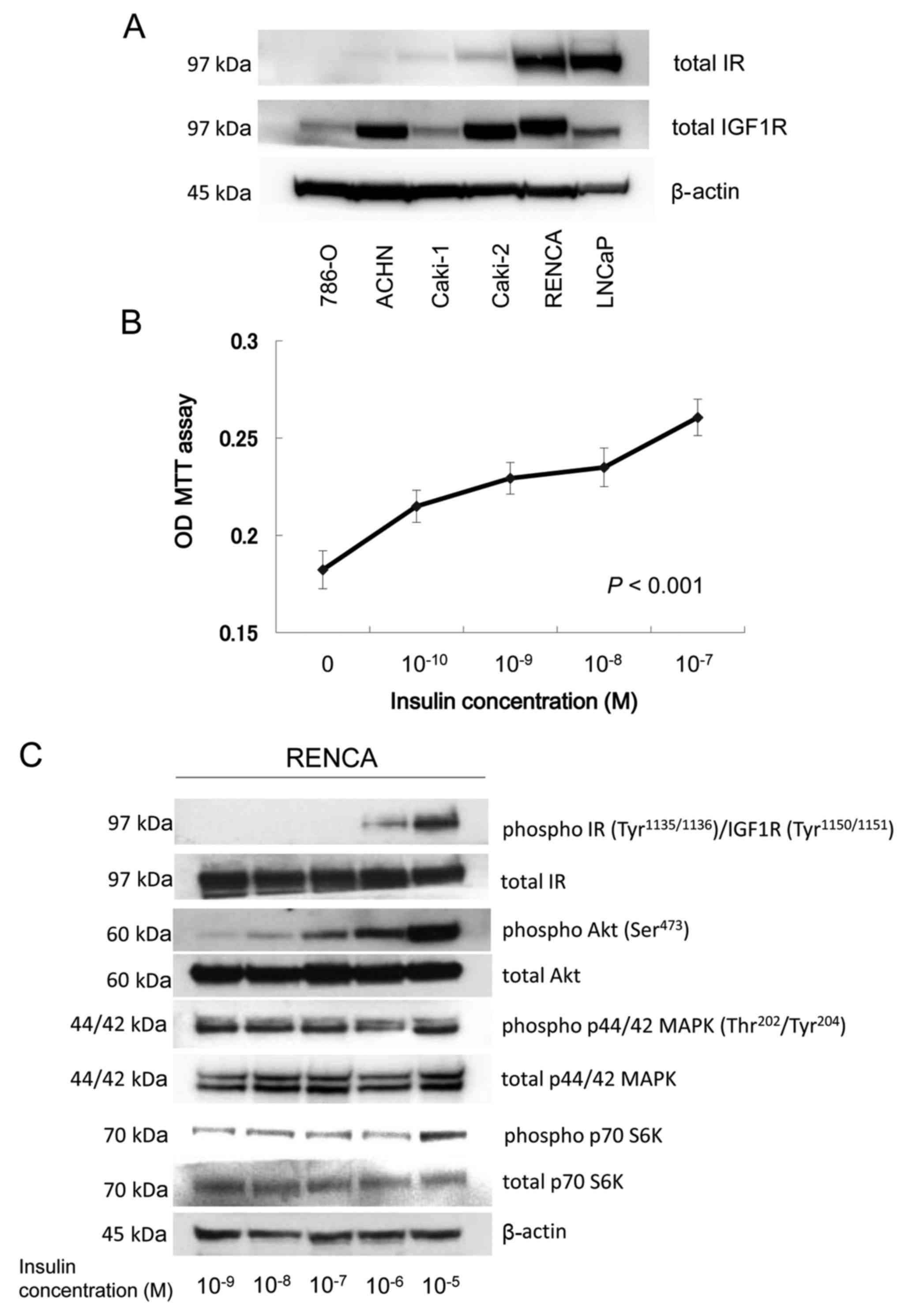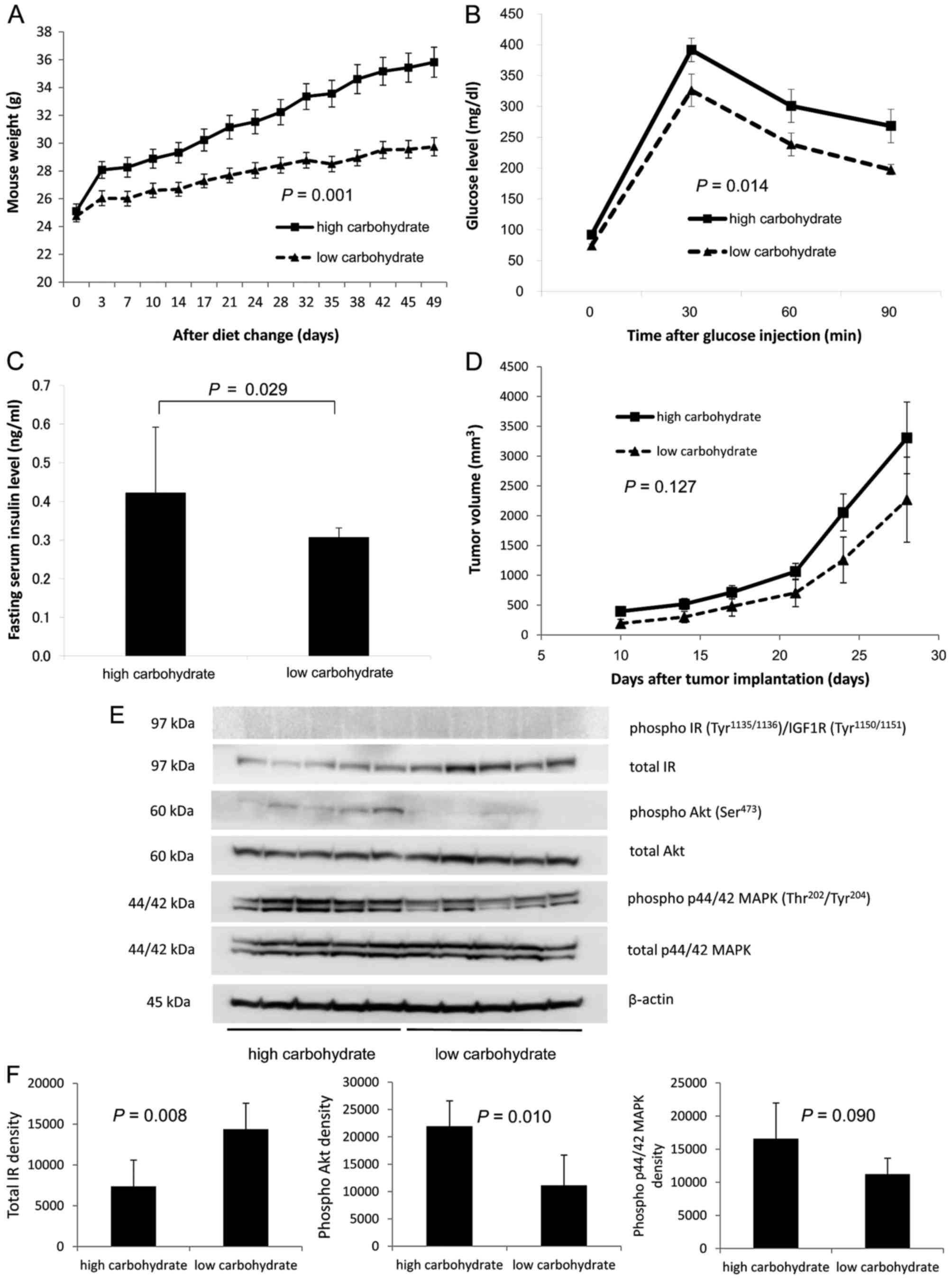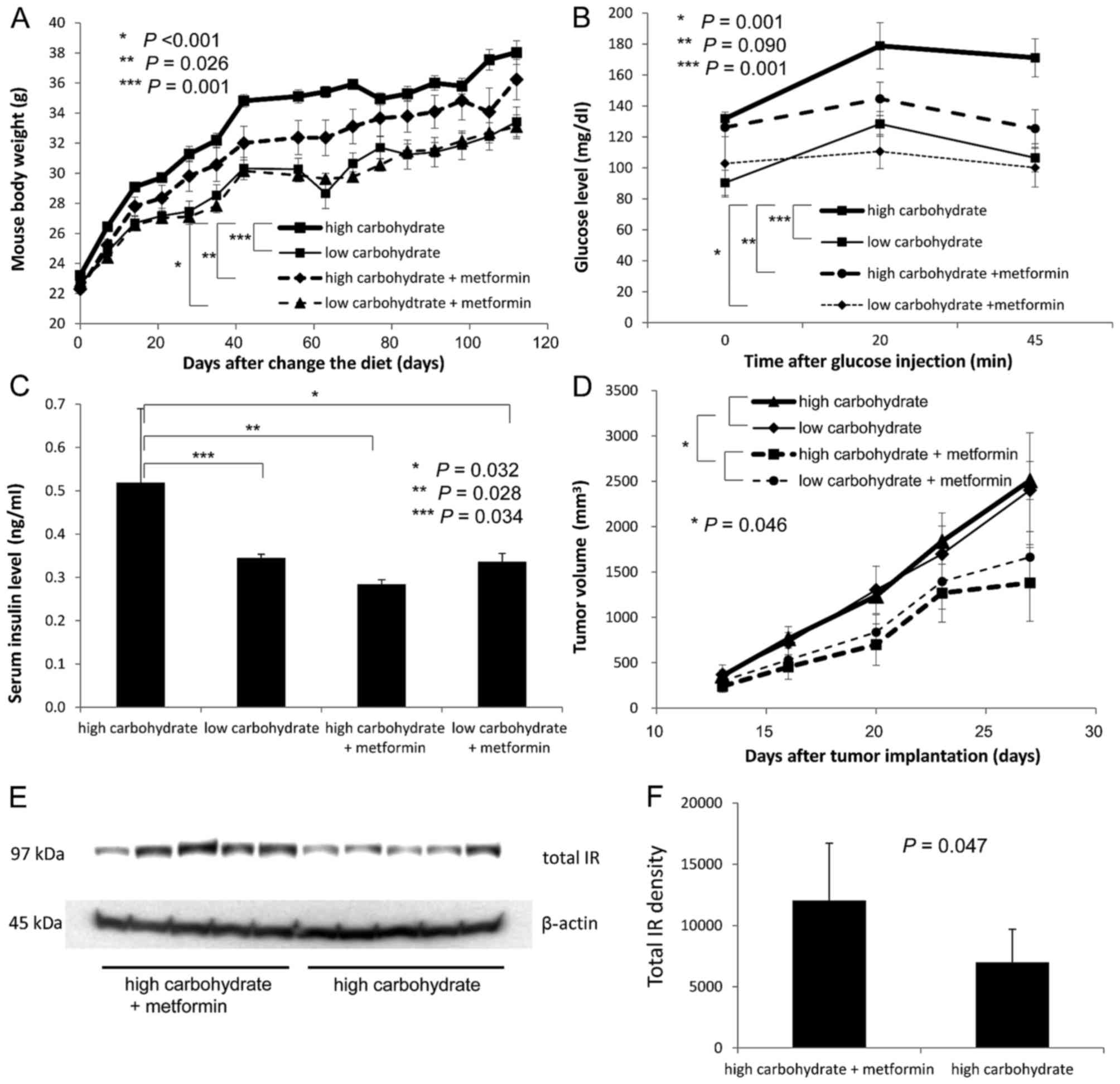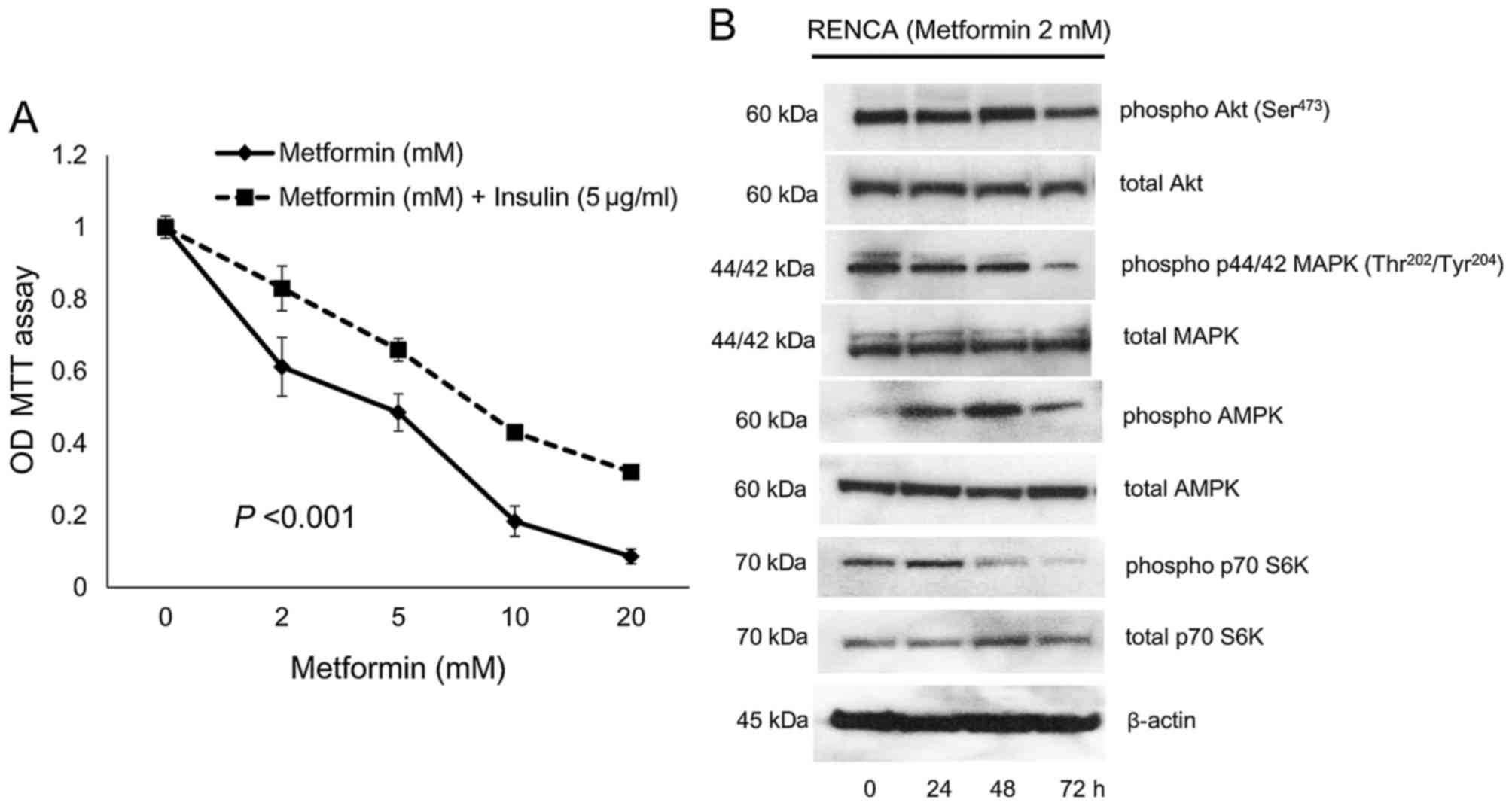|
1
|
Cohen DH and LeRoith D: Obesity, type 2
diabetes, and cancer: The insulin and IGF connection. Endocr Relat
Cancer. 19:F27–F45. 2012. View Article : Google Scholar : PubMed/NCBI
|
|
2
|
Ohnishi H, Saitoh S, Takagi S, Ohata J,
Takeuchi H, Isobe T, Katoh N, Chiba Y, Fujiwara T, Akasaka H, et
al: Incidence of insulin resistance in obese subjects in a rural
Japanese population: The Tanno and Sobetsu study. Diabetes Obes
Metab. 7:83–87. 2005. View Article : Google Scholar : PubMed/NCBI
|
|
3
|
Pollak M: Insulin and insulin-like growth
factor signalling in neoplasia. Nat Rev Cancer. 8:915–928. 2008.
View Article : Google Scholar : PubMed/NCBI
|
|
4
|
Nepple KG, Yang L, Grubb RL III and Strope
SA: Population based analysis of the increasing incidence of kidney
cancer in the United States: Evaluation of age specific trends from
1975 to 2006. J Urol. 187:32–38. 2012. View Article : Google Scholar : PubMed/NCBI
|
|
5
|
Bergström A, Hsieh CC, Lindblad P, Lu CM,
Cook NR and Wolk A: Obesity and renal cell cancer - a quantitative
review. Br J Cancer. 85:984–990. 2001. View Article : Google Scholar : PubMed/NCBI
|
|
6
|
Calle EE, Rodriguez C, Walker-Thurmond K
and Thun MJ: Overweight, obesity, and mortality from cancer in a
prospectively studied cohort of U.S. adults. N Engl J Med.
348:1625–1638. 2003. View Article : Google Scholar : PubMed/NCBI
|
|
7
|
Renehan AG, Tyson M, Egger M, Heller RF
and Zwahlen M: Body-mass index and incidence of cancer: A
systematic review and meta-analysis of prospective observational
studies. Lancet. 371:569–578. 2008. View Article : Google Scholar : PubMed/NCBI
|
|
8
|
Sawada N, Inoue M, Sasazuki S, Iwasaki M,
Yamaji T, Shimazu T and Tsugane S: JPHC Study Group: Body mass
index and subsequent risk of kidney cancer: A prospective cohort
study in Japan. Ann Epidemiol. 20:466–472. 2010. View Article : Google Scholar : PubMed/NCBI
|
|
9
|
Wideroff L, Gridley G, Mellemkjaer L, Chow
WH, Linet M, Keehn S, Borch-Johnsen K and Olsen JH: Cancer
incidence in a population-based cohort of patients hospitalized
with diabetes mellitus in Denmark. J Natl Cancer Inst.
89:1360–1365. 1997. View Article : Google Scholar : PubMed/NCBI
|
|
10
|
Inoue M, Iwasaki M, Otani T, Sasazuki S,
Noda M and Tsugane S: Diabetes mellitus and the risk of cancer:
Results from a large-scale population-based cohort study in Japan.
Arch Intern Med. 166:1871–1877. 2006. View Article : Google Scholar : PubMed/NCBI
|
|
11
|
Washio M, Mori M, Khan M, Sakauchi F,
Watanabe Y, Ozasa K, Hayashi K, Miki T, Nakao M, Mikami K, et al:
JACC Study Group: Diabetes mellitus and kidney cancer risk: The
results of Japan Collaborative Cohort Study for Evaluation of
Cancer Risk (JACC Study). Int J Urol. 14:393–397. 2007. View Article : Google Scholar : PubMed/NCBI
|
|
12
|
Pierce BL, Plymate S, Ostrander EA and
Stanford JL: Diabetes mellitus and prostate cancer risk. Prostate.
68:1126–1132. 2008. View Article : Google Scholar : PubMed/NCBI
|
|
13
|
Kasper JS and Giovannucci E: A
meta-analysis of diabetes mellitus and the risk of prostate cancer.
Cancer Epidemiol Biomarkers Prev. 15:2056–2062. 2006. View Article : Google Scholar : PubMed/NCBI
|
|
14
|
Parker AS, Lohse CM, Cheville JC, Thiel
DD, Leibovich BC and Blute ML: Greater body mass index is
associated with better pathologic features and improved outcome
among patients treated surgically for clear cell renal cell
carcinoma. Urology. 68:741–746. 2006. View Article : Google Scholar : PubMed/NCBI
|
|
15
|
Awakura Y, Nakamura E, Ito N, Yamasaki T,
Kamba T, Kamoto T and Ogawa O: Influence of body mass index on
prognosis of Japanese patients with renal cell carcinoma. Urology.
70:50–54. 2007. View Article : Google Scholar : PubMed/NCBI
|
|
16
|
Schrader AJ, Rustemeier J, Rustemeier JC,
Timmesfeld N, Varga Z, Hegele A, Olbert PJ and Hofmann R:
Overweight is associated with improved cancer-specific survival in
patients with organ-confined renal cell carcinoma. J Cancer Res
Clin Oncol. 135:1693–1699. 2009. View Article : Google Scholar : PubMed/NCBI
|
|
17
|
Jeon HG, Jeong IG, Lee JH, Lee CJ, Kwak C,
Kim HH, Lee SE and Lee E: Prognostic value of body mass index in
Korean patients with renal cell carcinoma. J Urol. 183:448–454.
2010. View Article : Google Scholar : PubMed/NCBI
|
|
18
|
Waalkes S, Merseburger AS, Kramer MW,
Herrmann TR, Wegener G, Rustemeier J, Hofmann R, Schrader M, Kuczyk
MA and Schrader AJ: Obesity is associated with improved survival in
patients with organ-confined clear-cell kidney cancer. Cancer
Causes Control. 21:1905–1910. 2010. View Article : Google Scholar : PubMed/NCBI
|
|
19
|
Carnethon MR, De Chavez PJ, Biggs ML,
Lewis CE, Pankow JS, Bertoni AG, Golden SH, Liu K, Mukamal KJ,
Campbell-Jenkins B, et al: Association of weight status with
mortality in adults with incident diabetes. JAMA. 308:581–590.
2012. View Article : Google Scholar : PubMed/NCBI
|
|
20
|
Choi Y, Park B, Jeong BC, Seo SI, Jeon SS,
Choi HY, Adami HO, Lee JE and Lee HM: Body mass index and survival
in patients with renal cell carcinoma: A clinical-based cohort and
meta-analysis. Int J Cancer. 132:625–634. 2013. View Article : Google Scholar : PubMed/NCBI
|
|
21
|
Hakimi AA, Furberg H, Zabor EC, Jacobsen
A, Schultz N, Ciriello G, Mikklineni N, Fiegoli B, Kim PH, Voss MH,
et al: An epidemiologic and genomic investigation into the obesity
paradox in renal cell carcinoma. J Natl Cancer Inst. 105:1862–1870.
2013. View Article : Google Scholar : PubMed/NCBI
|
|
22
|
Freedland SJ, Aronson WJ, Kane CJ, Presti
JC Jr, Amling CL, Elashoff D and Terris MK: Impact of obesity on
biochemical control after radical prostatectomy for clinically
localized prostate cancer: A report by the Shared Equal Access
Regional Cancer Hospital database study group. J Clin Oncol.
22:446–453. 2004. View Article : Google Scholar : PubMed/NCBI
|
|
23
|
Ho T, Gerber L, Aronson WJ, Terris MK,
Presti JC, Kane CJ, Amling CL and Freedland SJ: Obesity,
prostate-specific antigen nadir, and biochemical recurrence after
radical prostatectomy: Biology or technique? Results from the
SEARCH database. Eur Urol. 62:910–916. 2012. View Article : Google Scholar : PubMed/NCBI
|
|
24
|
Bhindi B, Kulkarni GS, Finelli A, Alibhai
SM, Hamilton RJ, Toi A, van der Kwast TH, Evans A, Hersey K, Jewett
MA, et al: Obesity is associated with risk of progression for
low-risk prostate cancers managed expectantly. Eur Urol.
66:841–848. 2014. View Article : Google Scholar : PubMed/NCBI
|
|
25
|
Ladoire S, Dalban C, Roché H, Spielmann M,
Fumoleau P, Levy C, Martin AL, Ecarnot F, Bonnetain F and
Ghiringhelli F: Effect of obesity on disease-free and overall
survival in node-positive breast cancer patients in a large French
population: A pooled analysis of two randomised trials. Eur J
Cancer. 50:506–516. 2014. View Article : Google Scholar : PubMed/NCBI
|
|
26
|
Gennari A, Nanni O, Puntoni M, DeCensi A,
Scarpi E, Conte P, Antonucci G, Amadori D and Bruzzi P: Body mass
index and prognosis of metastatic breast cancer patients receiving
first-line chemotherapy. Cancer Epidemiol Biomarkers Prev.
22:1862–1867. 2013. View Article : Google Scholar : PubMed/NCBI
|
|
27
|
Psutka SP, Stewart SB, Boorjian SA, Lohse
CM, Tollefson MK, Cheville JC, Leibovich BC and Thompson RH:
Diabetes mellitus is independently associated with an increased
risk of mortality in patients with clear cell renal cell carcinoma.
J Urol. 192:1620–1627. 2014. View Article : Google Scholar : PubMed/NCBI
|
|
28
|
Antonelli A, Arrighi N, Corti S, Zanotelli
T, Cozzoli A, Cunico Cosciani S and Simeone C: Pre-existing type 2
diabetes is not an adverse prognostic factor in patients with renal
cell carcinoma: A single-center retrospective study. Urol Oncol.
31:1310–1315. 2013. View Article : Google Scholar : PubMed/NCBI
|
|
29
|
Kellerer M, von Eye Corleta H, Mühlhöfer
A, Capp E, Mosthaf L, Bock S, Petrides PE and Häring HU: Insulin-
and insulin-like growth-factor-I receptor tyrosine-kinase
activities in human renal carcinoma. Int J Cancer. 62:501–507.
1995. View Article : Google Scholar : PubMed/NCBI
|
|
30
|
Lkhagvadorj S, Oh SS, Lee MR, Jung JH,
Chung HC, Cha SK and Eom M: Insulin receptor expression in clear
cell renal cell carcinoma and its relation to prognosis. Yonsei Med
J. 55:861–870. 2014. View Article : Google Scholar : PubMed/NCBI
|
|
31
|
Law JH, Habibi G, Hu K, Masoudi H, Wang
MY, Stratford AL, Park E, Gee JM, Finlay P, Jones HE, et al:
Phosphorylated insulin-like growth factor-i/insulin receptor is
present in all breast cancer subtypes and is related to poor
survival. Cancer Res. 68:10238–10246. 2008. View Article : Google Scholar : PubMed/NCBI
|
|
32
|
Mulligan AM, O'Malley FP, Ennis M, Fantus
IG and Goodwin PJ: Insulin receptor is an independent predictor of
a favorable outcome in early stage breast cancer. Breast Cancer Res
Treat. 106:39–47. 2007. View Article : Google Scholar : PubMed/NCBI
|
|
33
|
Mathieu MC, Clark GM, Allred DC, Goldfine
ID and Vigneri R: Insulin receptor expression and clinical outcome
in node-negative breast cancer. Proc Assoc Am Physicians.
109:565–571. 1997.PubMed/NCBI
|
|
34
|
Goodwin PJ, Ennis M, Pritchard KI, Trudeau
ME, Koo J, Madarnas Y, Hartwick W, Hoffman B and Hood N: Fasting
insulin and outcome in early-stage breast cancer: Results of a
prospective cohort study. J Clin Oncol. 20:42–51. 2002. View Article : Google Scholar : PubMed/NCBI
|
|
35
|
Muti P, Quattrin T, Grant BJ, Krogh V,
Micheli A, Schünemann HJ, Ram M, Freudenheim JL, Sieri S, Trevisan
M, et al: Fasting glucose is a risk factor for breast cancer: A
prospective study. Cancer Epidemiol Biomarkers Prev. 11:1361–1368.
2002.PubMed/NCBI
|
|
36
|
Cox ME, Gleave ME, Zakikhani M, Bell RH,
Piura E, Vickers E, Cunningham M, Larsson O, Fazli L and Pollak M:
Insulin receptor expression by human prostate cancers. Prostate.
69:33–40. 2009. View Article : Google Scholar : PubMed/NCBI
|
|
37
|
Ma J, Li H, Giovannucci E, Mucci L, Qiu W,
Nguyen PL, Gaziano JM, Pollak M and Stampfer MJ: Prediagnostic
body-mass index, plasma C-peptide concentration, and prostate
cancer-specific mortality in men with prostate cancer: A long-term
survival analysis. Lancet Oncol. 9:1039–1047. 2008. View Article : Google Scholar : PubMed/NCBI
|
|
38
|
Venkateswaran V, Haddad AQ, Fleshner NE,
Fan R, Sugar LM, Nam R, Klotz LH and Pollak M: Association of
diet-induced hyperinsulinemia with accelerated growth of prostate
cancer (LNCaP) xenografts. J Natl Cancer Inst. 99:1793–1800. 2007.
View Article : Google Scholar : PubMed/NCBI
|
|
39
|
Allred DC, Harvey JM, Berardo M and Clark
GM: Prognostic and predictive factors in breast cancer by
immunohistochemical analysis. Mod Pathol. 11:155–168.
1998.PubMed/NCBI
|
|
40
|
Algire C, Zakikhani M, Blouin MJ, Shuai JH
and Pollak M: Metformin attenuates the stimulatory effect of a
high-energy diet on in vivo LLC1 carcinoma growth. Endocr Relat
Cancer. 15:833–839. 2008. View Article : Google Scholar : PubMed/NCBI
|
|
41
|
Goodyear LJ, Giorgino F, Sherman LA, Carey
J, Smith RJ and Dohm GL: Insulin receptor phosphorylation, insulin
receptor substrate-1 phosphorylation, and phosphatidylinositol
3-kinase activity are decreased in intact skeletal muscle strips
from obese subjects. J Clin Invest. 95:2195–2204. 1995. View Article : Google Scholar : PubMed/NCBI
|
|
42
|
Liu J, Li M, Song B, Jia C, Zhang L, Bai X
and Hu W: Metformin inhibits renal cell carcinoma in vitro and in
vivo xenograft. Urol Oncol. 31:264–270. 2013. View Article : Google Scholar : PubMed/NCBI
|
|
43
|
Othman EM, Hintzsche H and Stopper H:
Signaling steps in the induction of genomic damage by insulin in
colon and kidney cells. Free Radic Biol Med. 68:247–257. 2014.
View Article : Google Scholar : PubMed/NCBI
|















